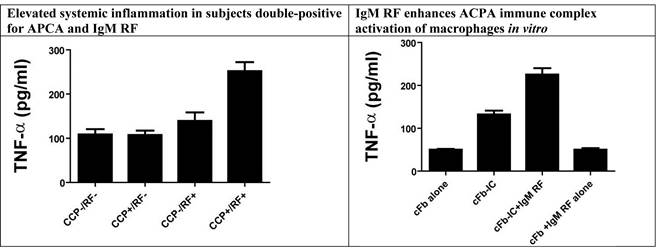Session Information
Session Type: Abstract Submissions (ACR)
Background/Purpose: The co-occurrence of rheumatoid factor (RF) and anti-citrullinated protein antibodies (ACPA) is well described in rheumatoid arthritis (RA), and has been associated with increased disease severity. However, the mechanisms underlying the potential interaction between these two distinct, but often co-existent, autoantibodies has not been well defined.
Methods: Multiplex cytokine profiles, plasma CRP levels, and disease activity scores (DAS28) were assessed in a cohort of 1,467 Veterans with RA (89% male). Patients were categorized into subgroups including double-negative (negative ACPA and RF; n=204), ACPA-positive (n=96), RF-positive (n=135), or double-positive (ACPA and RF positive; n=1031). Levels of each cytokine, CRP, and DAS28 score were compared between the double-negative, ACPA+, RF+, or double-positive subgroups using the Kruskal Wallis test with Tukey’s multiple comparison post-test. Molecular interaction between ACPA and RF was investigated using an in-vitro immune complex (IC) stimulation assay in which IgG derived from RA patient sera was incubated with citrullinated fibrinogen (cFb) to form cFb-IC in the presence or absence of monoclonal IgM RF. The stimulatory capacity of these immune complexes to activate macrophages was assessed by measuring TNFa production.
Results: Compared with the double-negative subgroup, the double-positive subgroup (possessing ACPA and RF) exhibited significantly higher levels of DAS28, CRP, and multiple inflammatory cytokines including TNFa, IL-1b, IL-6, IL12p70, and IL-17A (all P<0.001). Notably, compared to the ACPA+/RF- subgroup, there was a similar increase in the levels of DAS28, CRP, and key inflammatory cytokines among the double-positive population (all P<0.001). In vitro stimulation of monocyte-derived macrophages by ACPA-immune complexes demonstrated significantly increased cytokine production with the addition of monoclonal IgM rheumatoid factor as compared to ACPA-immune complexes alone (P=0.003)
Conclusion: The combined presence of ACPA and IgM RF mediates increased proinflammatory cytokine production in vitro, and is associated with significantly increased systemic inflammation and disease activity in patients with RA. Compared to the double-negative subgroup, those with ACPA or RF alone demonstrated no increase in markers of inflammation or disease activity, while levels were consistently elevated among the double-positive subgroup. Our data suggest that the ability of IgM RF to enhance the capacity of ACPA-immune complexes to stimulate macrophage cytokine production is responsible for the increased level of inflammatory mediators and disease activity in double-positive individuals, thereby providing a mechanistic link by which RF enhances the pathogenicity of ACPA-ICs in RA.
Disclosure:
J. Sokolove,
None;
D. Cheng,
None;
D. S. Johnson,
None;
T. R. Mikuls,
Roche/Genentech and Biogen IDEC Inc.,
2;
W. H. Robinson,
None.
« Back to 2013 ACR/ARHP Annual Meeting
ACR Meeting Abstracts - https://acrabstracts.org/abstract/igm-rheumatoid-factor-as-a-potentiator-of-anti-citrullinated-protein-antibody-mediated-inflammation-in-rheumatoid-arthritis/

